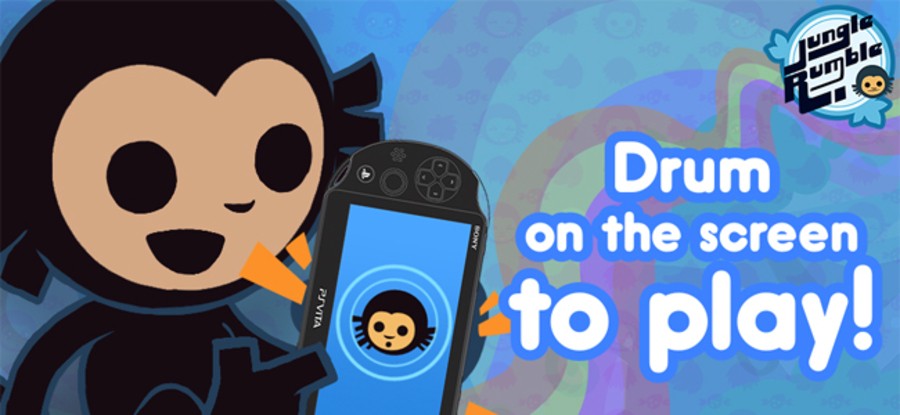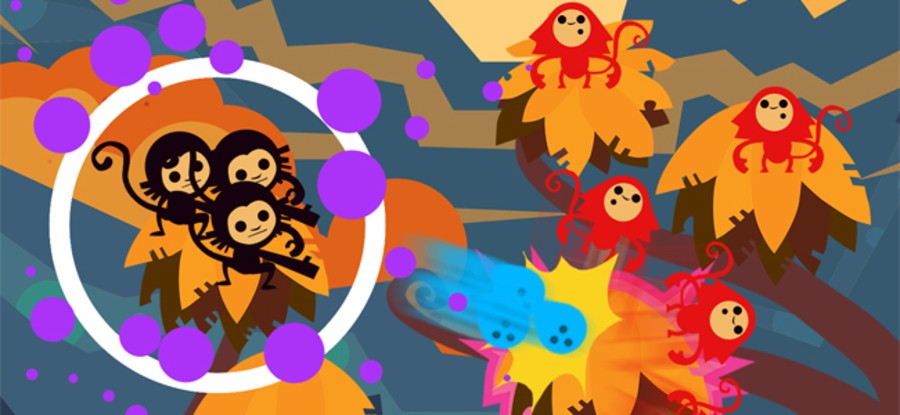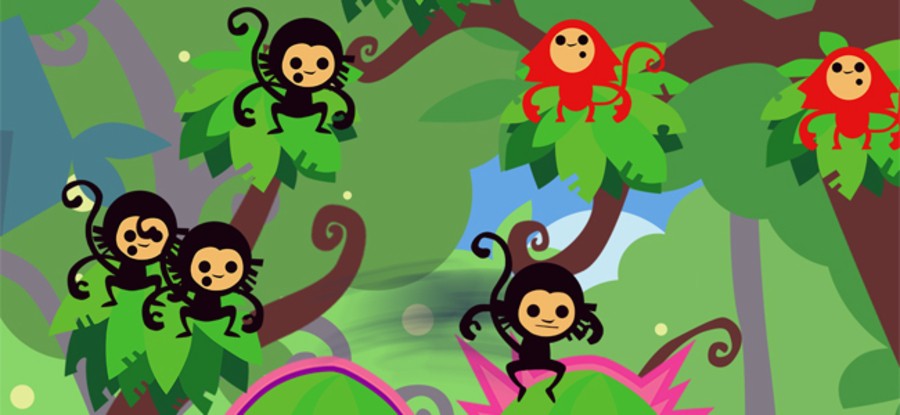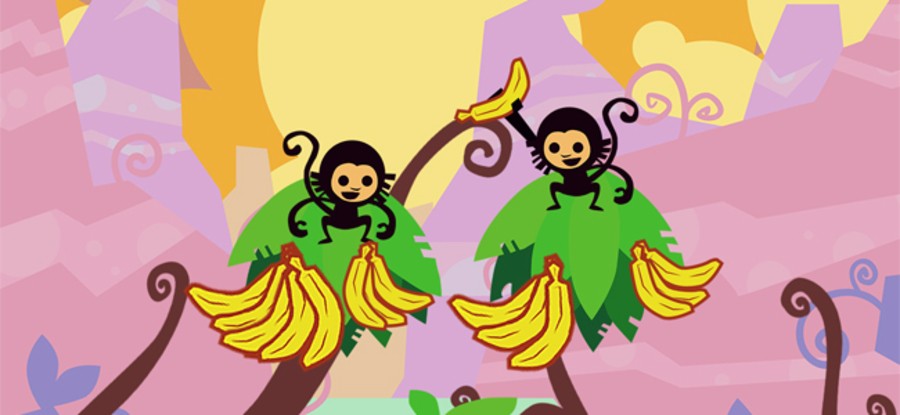
Out now on the North American PlayStation Store and coming soon to Europe, the delightfully named Jungle Rumble: Freedom, Happiness, and Bananas is an addictive rhythm title that sees you tapping your PlayStation Vita's screen in order to make cute little monkeys move. If you've been itching for something that's got a sprinkle of Patapon, you may have found a good remedy with indie developer Disco Pixel's colourful creation.
We caught up with Trevor Stricker to talk about the game, the industry, and indie development.
Push Square: How would you describe Jungle Rumble: Freedom, Happiness, and Bananas, to someone who may not have heard about the game?
Trevor Stricker: Jungle Rumble is a rhythm game where the player drums to control a tribe of monkeys. A rival tribe invades to steal bananas. The player drums on monkeys to send them into the fray. Drum on a monkey and drum on a tree to swing that monkey through the tree. Drum on a coconut and drum on an invader to throw that coconut at that invader. It's a rhythm puzzle game.

Rhythm games are surprisingly rare these days, especially on the Vita. What were your original thoughts behind building a game based around rhythm?
I have loved rhythm games since PaRappa's ridiculous "Kick, Punch, It's all in the mind" burned its way into my brain. I have always wanted to make a rhythm game. Traditionally, the player follows a script and presses exactly when told to. That irked me as a designer. I want to make games where the player makes meaningful choices. I want to make games where the player ponders tradeoffs between going fast-but-weak and slow-but-strong.
I was at a wedding where the dance floor got pretty crazy. The DJ suddenly stopped. Everyone looked around a little surprised. As I'm wondering if something happened, a band quietly snaked their way onto the dance floor. They all struck up, blowing horns, banging drums, rapping on a mic. The horns would blow at the bride's brother who would get more wild. The drums would turn towards the groom's nephew, who would shake and go insane. As they wound their way through the crowd I realized I wanted to make a game that was like being that band.
The game's got an attractive art style that could appeal to players of all ages. Was accessibility a focal point during development?
I really wanted iconic monkeys. [Disco Pixel's] Luigi and I were putting together early concepts and pondering how simple we could make a figure that's still recognizable as a monkey. Did it need the ears? The wide mouth? The tail? We would look at drawings and contemplate the "essence of monkeyness". I'm sure our neighbours in the co-working space, going about real business, thought we were kind of odd.
The funny thing about Jungle Rumble is that it's not an easy game. It's a radical enough twist on rhythm games to make it not very accessible. Even though there is a tutorial that explains everything, there is a learning curve. So maybe the cuteness is deceptive?

Did it seem like a natural move to bring Jungle Rumble to Vita, given the handheld's capabilities? Does the Vita version differ at all from the mobile version?
Yes. The Vita is really a great machine. It has the size and battery of a mobile device, but the thumbsticks and graphics processor of a game device. To be honest, I wish we had come out on Vita first. The Vita is meant for Video Games, capital letters. And we see that when we go to shows like PlayStation Experience where the response to "weird rhythm game" is "Cool! Let me try!" The hardware itself is top notch. We needed that multicore CPU to handle our realtime audio generation in another thread. We needed that quick response touch screen because we're making a rhythm game that depends on timing.
There are a bunch of new things for Vita. The coolest are the new levels. There are new side quests that walk the player through the deeper strategies. This also leads to more medals to earn. We added features to enable players who want to gold medal the whole game: being able to directly skip to a level in the middle of a stage, and a time display that shows when they have taken too long to earn a gold. We totally revamped the tutorial after watching hundreds of people play.
Indie titles now make up much of the Vita's library, and the indie gaming scene has expanded significantly in the last few years. How important do you think that it is for the industry as a whole to continue welcoming smaller studios?
A creative medium needs crazy new stuff or it turns grey and boring. EA isn't going to contemplate strange rhythm games about monkeys because the moment anyone has a spark of an idea there are countless market surveys and corporate hierarchies and bandwagon chasing to extinguish it. It takes two guys buried in the snow in Boston contemplating the essence of monkeyness to do that. Or guys buried in the snow in Sweden contemplating mining resources and crafting them into something...

Sony's positive attitude toward indie developers seems to be worthy of praise from many smaller studios. Do you agree? Do you think that Sony's approach has been an important one in attracting more people to indie titles?
Sony is amazing. What it's doing is certainly good for Sony, but it is also good for video games as a medium. If video games become corporate software products then the whole thing crashes, just like Atari did to us in '82.
The thing is Sony can't make people like indies. (And "indie" itself is meaningless.) Sony made a platform and they want that platform bursting with awesome stuff. People are attracted to compelling games, whether they are made by 2 people buried in snow in Boston or 200 typing in an office surrounded by palm trees in Los Angeles.
Are you looking forward to Jungle Rumble, or have you already swiped it from the PlayStation Store? Make us move to the beat of your thoughts in the comments section below.


Comments 4
Really a nice interview, I enjoyed. Hope to see more games from them on Vita soon.
Mm now I want a new Parrappa the Rapper game. It can be downloadable.
Please keep the interviews with the developers. Most of the times they are very interesting.
Very cute but not for me, I've never liked rhythm or music based games really. If it swings round on PS plus then maybe it can change my mind.
Tap here to load 4 comments
Leave A Comment
Hold on there, you need to login to post a comment...